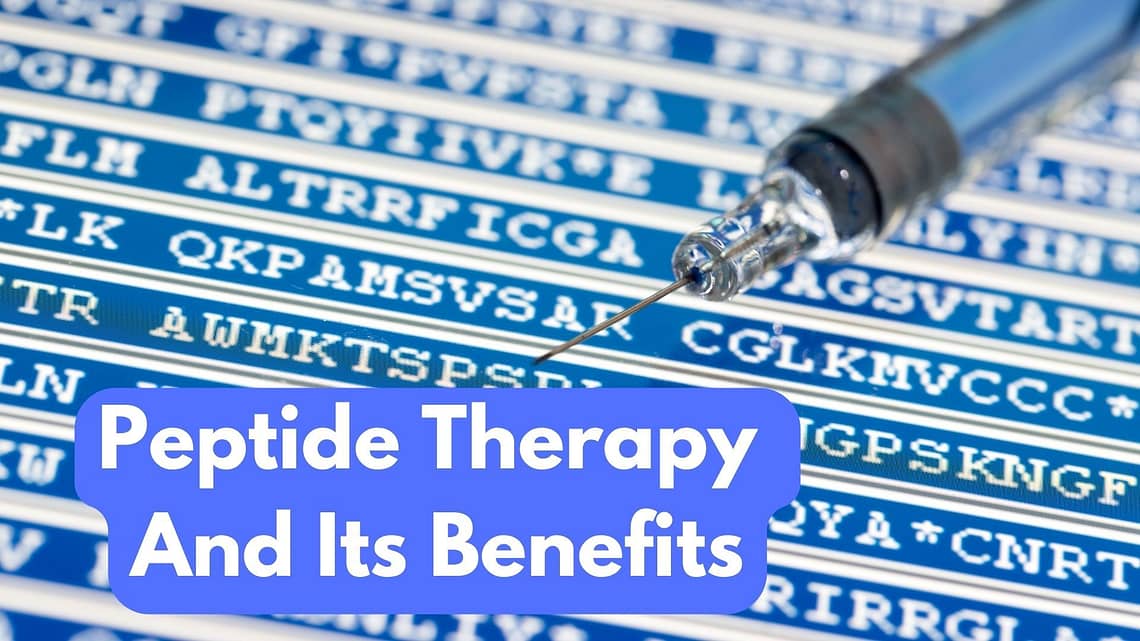Peptide therapy is a cutting-edge medical treatment that utilizes short chains of amino acids, called peptides, to enhance the body’s natural healing processes. By stimulating specific cellular pathways, this therapy can address a range of health concerns, including improving hormone balance, boosting immune function, and promoting tissue repair.
With its targeted approach and minimal side effects, peptide therapy holds immense potential to revolutionize modern medicine. Discover the fascinating world of peptide therapy and explore its myriad benefits for optimal wellness.
Overview of Peptide Therapy
Definition of peptide therapy
It is a rapidly evolving field in the field of medicine that involves the use of peptides, which are short chains of amino acids, to stimulate various physiological processes in the body. These peptides are administered through injections or other delivery methods and work by targeting specific receptors in cells, triggering a desired response.

This image is property of images.pexels.com.
History and development of peptide therapy
It has its roots in the discovery of insulin in the early 20th century. Since then, scientists have made significant advancements in understanding the role of peptides in various bodily functions. The development of synthetic peptides has allowed for more targeted and precise therapeutic applications. Today, it is emerging as a promising approach for treating a wide range of health conditions.
How peptide therapy works in the body
When peptides are introduced into the body, they bind to specific receptors on cells, triggering a cascade of biochemical reactions. These reactions can lead to a variety of therapeutic effects, depending on the specific peptide used. This therapy can regulate hormone levels, stimulate muscle growth, reduce inflammation, improve cognitive function, and provide numerous other health benefits. By targeting specific cellular pathways, this therapy offers a highly targeted approach to healthcare.
Benefits of Peptide Therapy
Improved muscle growth and development
Peptide therapy has gained popularity among athletes and bodybuilders due to its ability to enhance muscle growth and development. Certain peptides, such as growth hormone-releasing peptides, stimulate the release of growth hormone in the body, which in turn promotes muscle growth. This can lead to increased strength, improved athletic performance, and a more sculpted physique.
Enhanced fat loss and weight management
Peptides that target fat metabolism can aid in weight loss and weight management efforts. For example, the peptide known as lipolysis-inducing peptide stimulates the breakdown of stored fat cells, allowing for more efficient fat burning. This can help individuals achieve their weight loss goals and maintain a healthy body composition.
Increased energy levels and vitality
Peptide therapy has the potential to boost energy levels and vitality by enhancing cellular metabolism. Peptides such as BPC-157, for instance, promote tissue repair and regeneration, leading to improved energy levels and overall well-being. By optimizing cellular function, this therapy can help individuals feel more energized and rejuvenated.
Improved skin health and complexion
Peptide therapy has gained recognition for its benefits in promoting skin health and improving complexion. Peptides like collagen-stimulating peptides can enhance the production of collagen, a protein responsible for maintaining the skin’s elasticity and youthfulness. This can result in reduced wrinkles, improved skin texture, and a more radiant complexion.
Enhanced cognitive function and mental clarity
Certain peptides have shown promise in improving cognitive function and mental clarity. For example, nootropic peptides can enhance neurotransmitter activity and promote neuroplasticity. This can lead to improved memory, focus, and overall cognitive performance. This therapy offers a potential avenue for individuals seeking to enhance their mental capabilities.
Boosted immune system and disease prevention
Peptide therapy can have a positive impact on the immune system by improving immune function and regulating immune responses. Peptides such as thymosin alpha-1 can enhance immune cell activity, increase antibody production, and modulate immune system activity. This can help individuals in preventing and combating various diseases and infections.
Also Check: Does Crying Really Burn Calories Efficiently?
Regulation of hormones and improved hormonal balance
Hormonal imbalances can have a significant impact on overall health and well-being. Peptide therapy offers a targeted approach to regulating hormones and achieving hormonal balance. Peptides like gonadotropin-releasing hormone analogs can stimulate the release of certain hormones, while others can inhibit hormone production when levels are excessive. This can help address conditions related to hormonal imbalances and improve overall health.
Reduced inflammation and joint pain relief
Chronic inflammation and joint pain can significantly impact quality of life. Peptide therapy has shown promise in reducing inflammation and providing relief from joint pain. Peptides like BPC-157 and LL-37 can modulate immune responses and promote tissue regeneration, aiding in the reduction of inflammation and accelerated healing of damaged tissues.
Accelerated wound healing and tissue repair
Peptide therapy has demonstrated remarkable potential for promoting wound healing and tissue repair. Peptides like thymosin beta-4 can enhance the migration and proliferation of cells involved in wound healing, leading to accelerated healing and improved tissue regeneration. This can be particularly beneficial for individuals recovering from injuries, surgeries, or chronic wounds.
Anti-aging properties and longevity benefits
Peptide therapy has captured attention for its anti-aging properties and potential longevity benefits. Certain peptides, like growth hormone-releasing peptides and epitalon, can counteract aging and rejuvenate cells. By enhancing cellular function, these peptides may contribute to a slower aging process and improved longevity.

This image is property of images.pexels.com.
Frequently Asked Question (FAQs)
What conditions can peptide therapy help treat?
Peptide therapy has shown promise in addressing various health conditions, including hormone imbalances, muscle wasting, chronic inflammation, joint pain, skin aging, cognitive decline, and immune system dysfunction. However, the specific peptides used and the treatment approach should be tailored to individual needs. Consultation with a qualified healthcare professional is important to determine the suitability of peptide therapy for specific conditions.
Is peptide therapy safe?
When administered under the guidance of a qualified healthcare professional, it is generally considered safe. Peptides are naturally occurring substances in the body and have a low risk of adverse effects. However, individual responses may vary, and it is important to undergo proper medical assessment and monitoring throughout the treatment process.
What are the most commonly used peptides in therapy?
Some commonly used peptides in therapy include growth hormone-releasing peptides (GHRPs), insulin-like growth factor (IGF), thymosin peptides, collagen-stimulating peptides, and nootropic peptides. The choice of peptides will depend on the desired therapeutic effect and individual needs.
How long does it take to see results from peptide therapy?
The timeframe for seeing results from peptide therapy varies depending on various factors, such as the specific condition being treated, the individual’s response to the peptides, and the treatment plan. Some individuals may experience noticeable improvements within a few weeks, while others may require a longer duration of therapy.
Does peptide therapy have any side effects?
It is generally well-tolerated, with minimal side effects. However, some individuals may experience temporary redness, swelling, or discomfort at the injection site. Rarely, allergic reactions or hormonal imbalances may occur. It is important to consult with a healthcare professional and undergo proper medical supervision to minimize the risk of side effects.
Is peptide therapy suitable for everyone?
This therapy may not be suitable for everyone, and individual medical assessment is crucial to determine its appropriateness. Certain medical conditions, such as cancer, pregnancy, or severe kidney or liver dysfunction, may require caution or contraindicate the use of certain peptides. Consulting with a qualified healthcare professional is essential to ensure personalized and safe treatment.
Can peptide therapy be used in conjunction with other treatments?
It can be used in conjunction with other treatments, depending on the individual’s healthcare needs and the advice of a qualify healthcare professional. Integrated treatment plans may incorporate peptide therapy alongside other interventions, such as lifestyle modifications, medication, or physical therapy.
Is peptide therapy regulated by medical authorities?
It falls under the regulation of medical authorities, and the use of certain peptides may require prescriptions or medical supervision. It is important to consult with a qualified healthcare professional who is knowledgeable about this therapy and adheres to regulations and guidelines.
How often do I need to undergo peptide therapy?
Is peptide therapy cover by insurance?
Insurance coverage for this therapy may vary depending on the specific insurance provider and the country or region of residence. Some insurance plans may cover certain aspects of this therapy, while others may deem it an alternative or experimental treatment not covered by insurance. It is advisable to check with the insurance provider to understand coverage options and potential reimbursement.
Conclusion
It offers a range of potential benefits, including improved muscle growth, fat loss, energy levels, skin health, cognitive function, immune system function, hormonal balance, inflammation reduction, wound healing, and anti-aging effects. By leveraging the therapeutic potential of peptides, individuals can address various health conditions and enhance their overall well-being.
While it offers numerous benefits, it is crucial to consult with a qualified healthcare professional before initiating treatment. A healthcare professional can assess individual health needs, guide treatment decisions, monitor progress, and ensure the safe and effective use of peptides. With proper medical supervision, individuals can maximize the benefits of this therapy and optimize their overall health and well-being.





